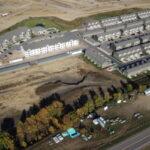Record year for real estate investment firm surges into 2023, with a dozen developments underway
 The projects are getting bigger. The geography is getting bigger. And the combination led to the biggest year yet in 2022 for Sioux Falls-based real estate investment firm Ernst Capital Group. “For us, 2022 was a record year in a significant way,” partner Chris Daugaard said. “We focused both on setting up our portfolio for long-term success and on capturing larger opportunities that are allowing us to build some economies of scale.”
The projects are getting bigger. The geography is getting bigger. And the combination led to the biggest year yet in 2022 for Sioux Falls-based real estate investment firm Ernst Capital Group. “For us, 2022 was a record year in a significant way,” partner Chris Daugaard said. “We focused both on setting up our portfolio for long-term success and on capturing larger opportunities that are allowing us to build some economies of scale.”
For instance, the firm is invested in 14 active construction projects, which continue in 2023. Combined, they total more than 2,500 units of multifamily housing being added to the portfolio in addition to multiple retail centers. “Our average multifamily development in the past was 100 to 150 units, and now it’s not uncommon to see 275 to 350 units,” Daugaard explained. “We saw an opportunity while interest rates were still favorable and worked to start new projects in a condensed time frame of eight or nine months, instead of spreading them out over 18 months as we might have done in a different environment.” That strategy allowed Ernst to appropriately time the interest rate environment and build projects, while addressing the continued high occupancy rate in its portfolio and within the markets it serves. “Our occupancy is holding very firm – currently 97 percent occupied and between 97 and 98 percent leased on a general day, and that’s been pretty consistent even in the heart of winter,” Daugaard said. “So it’s still very healthy and strong both in Sioux Falls and the other markets we’re developing.”
Ernst began with real estate investments in Sioux Falls, and about half its current development pipeline is still within the city and adjacent communities. But the firm also has expanded with investments in Brookings, Box Elder, Sioux City and Rapid City, as well as Des Moines, and with a planned entry into Omaha. “We’re making a more deliberate effort to grow in markets that we think have strong fundamentals and the stability to deliver similar results as we’ve seen in Sioux Falls,” Daugaard said.
Ernst also prioritized investing in its current portfolio within the past year, including significant refinancing across the portfolio and capital investments to support its existing assets. “These are things that might not have needed to be done today, but we had an opportunity to either set aside funds or start work today knowing we have to do it in the next few years, so we were able to take advantage of the low interest rate environment,” Daugaard said. “We did as much as we could to remove hurdles that might have presented themselves in the future.” That included things such as refreshing common spaces in some commercial buildings and setting aside reserves for build-outs or tenant needs. “On the investor front, I think investors continue to appreciate the consistent returns we’ve seen from real estate, especially multifamily,” Daugaard said. “We haven’t had any real drop-off in investor interest from the past couple years.” The coming year will bring continued investment in multifamily development on the east side of Sioux Falls, where Willows Edge had a successful lease-up and demand for residential options continues. Projects also are in development in northwest Sioux Falls, the far east side and in Omaha.
Existing work will continue in the Stadium Crossing development at 69th Street and Cliff Avenue, and in Harrisburg, where additional multifamily and new retail are under construction. Key drivers going forward continue to be construction costs, which have moderated some but more importantly have become more predictable, he said. The slowdown in single-family housing has improved the labor supply more broadly in construction, he added. “Our focus is on making sure we do what we can to build efficiently and find the right deal and the right deal structure in an interest rate environment that’s changed drastically.” The changing approach to financing has weighted deals heavier in equity, he said. “Even if our deal sizes moderate this year, we could be raising more capital than last year,” Daugaard said. “Our deals will likely have a lot more equity in them.”
